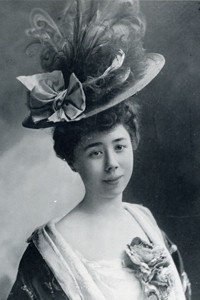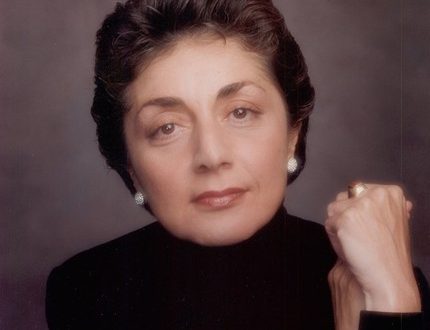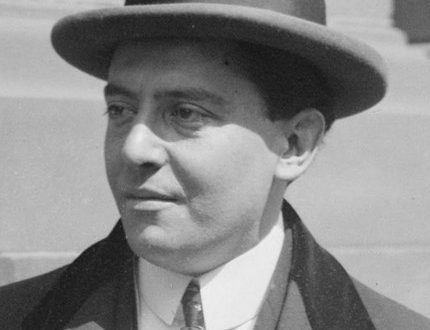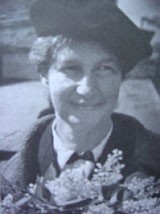
Marguerite Long (Marguerite Long) |
Marguerite Long

On April 19, 1955, representatives of the musical community of our capital gathered at the Moscow Conservatory to greet the outstanding master of French culture – Marguerite Long. The rector of the conservatory A. V. Sveshnikov presented her with the diploma of an honorary professor – a recognition of her outstanding services in the development and promotion of music.
This event was preceded by an evening that was imprinted in the memory of music lovers for a long time: M. Long played in the Great Hall of the Moscow Conservatory with an orchestra. “The performance of a wonderful artist,” wrote A. Goldenweiser at the time, “was truly a celebration of art. With amazing technical perfection, with youthful freshness, Marguerite Long performed Ravel’s Concerto, dedicated to her by the famous French composer. The large audience that filled the hall enthusiastically greeted the wonderful artist, who repeated the finale of the Concerto and played Fauré’s Ballad for piano and orchestra beyond the program.
- Piano music in the Ozon online store →
It was hard to believe that this energetic, full of strength woman was already over 80 years old – her game was so perfect and fresh. Meanwhile, Marguerite Long won the sympathy of the audience at the beginning of our century. She studied piano with her sister, Claire Long, and then at the Paris Conservatory with A. Marmontel.
Excellent pianistic skills allowed her to quickly master an extensive repertoire, which included works by classics and romantics – from Couperin and Mozart to Beethoven and Chopin. But pretty soon the main direction of its activity was determined – the promotion of the work of contemporary French composers. A close friendship connects her with the luminaries of musical impressionism – Debussy and Ravel. It was she who became the first performer of a number of piano works by these composers, who devoted many pages of beautiful music to her. Long introduced the listeners to the works of Roger-Ducas, Fauré, Florent Schmitt, Louis Vierne, Georges Migot, musicians of the famous “Six”, as well as Bohuslav Martin. For these and many other musicians, Marguerite Long was a devoted friend, a muse who inspired them to create wonderful compositions, which she was the first to give life to on the stage. And so it went on for many decades. As a sign of gratitude to the artist, eight prominent French musicians, including D. Milhaud, J. Auric and F. Poulenc, presented her with specially written Variations as a gift for her 80th birthday.
M. Long’s concert activity was especially intense before the First World War. Subsequently, she somewhat reduced the number of her speeches, devoting more and more energy to pedagogy. Since 1906, she taught a class at the Paris Conservatory, since 1920 she became a professor of higher education. Here, under her leadership, a whole galaxy of pianists went through an excellent school, the most talented of which gained wide popularity; among them J. Fevrier, J. Doyen, S. Francois, J.-M. Darre. All this did not prevent her from time to time touring in Europe and overseas; so, in 1932, she made several trips with M. Ravel, introducing listeners to his Piano Concerto in G major.
In 1940, when the Nazis entered Paris, Long, not wanting to cooperate with the invaders, left the conservatory teachers. Later, she created her own school, where she continued to train pianists for France. In the same years, the outstanding artist became the initiator of another initiative that immortalized her name: together with J. Thibault, she founded in 1943 a competition for pianists and violinists, which was intended to symbolize the inviolability of the traditions of French culture. After the war, this competition became international and is held regularly, continuing to serve the cause of the dissemination of art and mutual understanding. Many Soviet artists became its laureates.
In the post-war years, more and more students of Long occupied a worthy place on the concert stage – Yu. Bukov, F. Antremont, B. Ringeissen, A. Ciccolini, P. Frankl and many others owe her their success to a large extent. But the artist herself did not give up under the pressure of youth. Her playing retained its femininity, purely French grace, but did not lose its masculine severity and strength, and this gave a special attraction to her performances. The artist actively toured, made a number of recordings, including not only concerts and solo compositions, but also chamber ensembles – Mozart’s sonatas with J. Thibaut, Faure’s quartets. The last time she performed publicly in 1959, but even after that she continued to take an active part in musical life, remained a member of the jury of the competition that bore her name. Long summed up her teaching practice in the methodical work “Le piano de Margerite Long” (“The Piano Marguerite Long”, 1958), in her memoirs of C. Debussy, G. Foret and M. Ravel (the latter came out after her death in 1971 ).
A very special, honorable place belongs to M. Long in the history of Franco-Soviet cultural ties. And before her arrival in our capital, she cordially hosted her colleagues – Soviet pianists, participants in the competition named after her. Subsequently, these contacts became even closer. One of the best students of Long F. Antremont recalls: “She had a close friendship with E. Gilels and S. Richter, whose talent she immediately appreciated.” Close artists recall how enthusiastically she met the representatives of our country, how she rejoiced at each of their successes at the competition that bore her name, called them “my little Russians.” Shortly before her death, Long received an invitation to be the guest of honor at the Tchaikovsky Competition and dreamed of the upcoming trip. “They will send a special plane for me. I must live to see this day,” she said … She lacked a few months. After her death, French newspapers published the words of Svyatoslav Richter: “Marguerite Long is gone. The golden chain that connected us with Debussy and Ravel broke…”
Cit.: Khentova S. “Margarita Long”. M., 1961.
Grigoriev L., Platek Ya.





